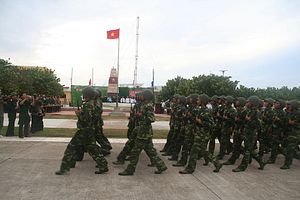Will Vietnam follow the Philippines in legally challenging through international arbitration China’s claim to territories it contests in the South China Sea (SCS)? Weeks after The Hague-based Permanent Court of Arbitration’s landmark ruling on July 12, an international law based decision that delegitimized most of China’s expansive claims in its controversial “nine-dash line” map for the maritime area, Vietnam’s Communist Party leaders are under rising political pressure to leverage the precedent to press its own claims over the contested Paracel archipelago.
Vietnam’s foreign ministry welcomed the tribunal’s highly anticipated ruling, saying in a statement that it “strongly supports” dispute resolution in the SCS through “peaceful measures, including diplomatic and legal procedures.” The statement also reaffirmed Vietnam’s claim to the two archipelagos (the Spratlys and the Paracels) under the 1982 United Nations Convention of the Law of the Sea (UNCLOS). State media have since published a series of comments by local officials and experts who have argued for filing a similar arbitration suit against China at the Hague.
Legal experts say that the tribunal’s ruling has fortified Vietnam’s position vis-à-vis China. First, the decision found China’s nine-dash line map based on so-called “historic rights” over islands and features in the South China Sea incompatible with UNCLOS and without legal basis. Second, the tribunal found that none of the contested features in the Spratly archipelago legally constitute “islands,” thereby nullifying China’s claim of a 200 mile Exclusive Economic Zone (EEZ) extending from the features it controls in the disputed island chain. Vietnam does not claim 200 mile EEZs in either the Spratlys or Paracels.
Tran Cong Truc, former head of Vietnam’s border affairs committee, wrote on July 22 in state newspaper Giao Duc that the ruling provided sufficient legal grounds for Vietnam to bring China to international court. While the PCA’s ruling undermined China’s EEZ claims in the Spratlys, Truc wrote that the same legal argument about what constitutes an “island” could be used to challenge China’s 200 mile EEZ claim over the Paracels. (The Paracels were not covered in the Philippines’ complaint.) Truc also argued Vietnam could take legal action against China’s persistent abuse of its fishermen, including cases of murder and sunken vessels, in the contested archipelago.
The former senior official at the same time advised caution, reflecting the Communist Party leadership’s reluctance to overtly confront Beijing. “As to when Vietnam should do this, we need to think very carefully, taking into account the political climate and environment we are facing,” Truc wrote. “Vietnam has to think, ‘would taking legal action against China increase tensions’? … For now no court is more powerful than the court of international opinion. This court has caused China much more tension and frustration than any legal arena that China has refused to take part [in].”
If Beijing accepted the legal basis of the decision, then there would no longer be any overlapping areas between Vietnam’s central coast-based EEZ and China’s nine-dash line map, according to analysts. China has so far been defiant against the non-binding ruling, including the decision legally relevant to the Paracels that “the Spratly Islands cannot generate maritime zones collectively as a unit.” China used its 200 mile claimed EEZ off the Paracels to justify the placement of its HD-981 oil rig into Vietnamese claimed waters in mid- 2014, sparking a crisis that led to fatal anti-China rioting in central Vietnam and a sharp deterioration in bilateral ties.
“Early signals indicate that China does not plan to retreat from claiming historic rights within the Nine-Dash Line, which likely include entitlement to fisheries and hydrocarbon resources,” International Crisis Group analyst Yanmei Xie wrote in a commentary. “Its claim to internal waters suggests China may consider drawing a baseline around the entirety of the Spratly island chain, claiming internal waters within the baseline and maritime entitlement outward from it.”
Days before the verdict, Vietnamese officials accused China’s coastguard of sinking one of its fishing boats near the Paracel Islands. Reports said the fishermen spent hours in the water before another Vietnamese fishing vessel was permitted to rescue them. In a separate incident days after the ruling, Vietnamese border patrol vessels chased six Chinese fishing boats out of waters off the coast of central Quang Binh province, also near the Paracels. Vietnamese state media reports cited the exact latitude and longitude of the alleged incursion to be ten miles inside the line of the recognized common fishing area.
China’s perceived aggression before and after the PCA ruling have brought activists and apparatchiks into nationalistic alignment. Nguyen Thein Nhan, a politburo member and president of the pro-government Vietnam Fatherland Front, told the National Assembly on July 20 that the public is increasingly concerned over Chinese harassment of Vietnamese fishermen in the country’s traditional fishing grounds and that the government needs to take “urgent actions” to contend with Chinese expansionism and militarization in the disputed archipelagos. Nhan portrayed China’s recent acts as “serious violations” of national sovereignty.
That view was amplified by Le Cong Dinh, a prominent human rights lawyer and former political prisoner. “The PCA ruling puts the Vietnamese government and Communist Party in a difficult position: from now on they can no longer do what they wish, which is to hold bilateral talks with China in order to resolve maritime disputes,” Dinh said in a recent commentary. “As reflected in the PCA ruling, resolving SCS disputes and starting legal proceedings against China has become an international issue. This is what the Vietnamese people want and the Vietnamese Communist Party and government must listen to their demand.”
































